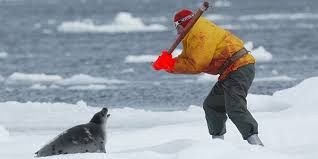I’ve sometimes seen the case made that Canadians are passionate advocates for animals. To this I’d have to say that yes, I agree that we’ve had some notable successes lately. And I’ll certainly concede, happily, that Canadians are generally compassionate people. However, let’s not be too quick to pat ourselves on the back, as we have some glaring deficiencies when it comes to some of our animal welfare laws and practices.
Let me point out just a couple of these, as food for thought.
- The transport of livestock, essentially from the farm to the slaughterhouse, takes place within a country’s legislative framework. There are legal limits set on how long the animals can be in transit, how long they can go without food & water, and the temperature extremes they can be subjected to, in trailers that are neither cooled in the scorching heat of summer, or heated in the dead of winter. What we allow here in Canada lags behind standards in the United States, and far behind those of the E.U. This is inflicted routinely on cows, pigs and chickens, especially, and our typical transport conditions for these animals are nothing short of cruel, by any standard. And much in need of improvement.
- Canada has an annual, commercial seal hunt which is, frankly, barbaric. Despite an international outcry, the hunt persists, not only legally permitted, but actively encouraged with our tax dollars in the form of government subsidies. Anyone could quickly find graphic and disturbing video of these hunts online, but most of us would never even think to go looking for it, and we mostly remain unaware of this practice.
Now I will say this – after seeing video captured by PETA or HSI out on the ice, or the images of pigs suffering from dehydration in sweltering heat inside a livestock trailer, I don’t believe the average Canadian is indifferent. But most of us will never see these images, and it falls to forceful advocates to bring them to light.
The past year has seen some notable improvements in Canada’s record on the treatment of animals. Bill S-203 is obviously is the standout moment, but there’s more. We stood up to the wasteful and inhumane practice of shark finning, for example. The general thrust of legislative accomplishments suggests an underlying current of compassion and heightened environmental awareness driving politicians to act. And that is indeed a very positive sign that we’re moving in the right direction as a society.
Yet, here we have this sickening cruelty from factory ships, which most Canadians would find appalling were they to have their attention drawn to it, but which nevertheless continues to exist – in large part because of government subsidies. How can this be? Before we take too many liberties in declaring ourselves a compassionate country, let’s make sure we’re being more vigilant about what goes on within our borders.
If the goal is to be a citizenry that consistently displays the ideals of compassion and fair treatment of animals, have we risen to the level of the E.U. when they took the enlightened step of naming the octopus an honorary vertebrate? (So that octopi, with their relatively sophisticated nervous systems and high intelligence – unique among invertebrates so far as we’ve discovered – would benefit from animal cruelty laws which apply to vertebrates as a threshold.) Yet, the E.U. is a place that allows the killing of tens of thousands of dolphins as ‘by-catch’ for the fishing industry. Not to mention what they permit to happen on the beaches of the Faroe Islands.
Some places have done much better than others, certainly, but few places on Earth are anywhere close to where we need to be if we’re to call ourselves compassionate and kind to animals!
So, as in most countries, ours is a mixed record. As Canadians, we need to keep paying attention. Being responsible (and humane!) in our relationships with other species means that we can’t allow ourselves the luxury of complacency.
For The Orca’s Voice,
Anna, Canadian Cetacean Alliance



Leave a Reply